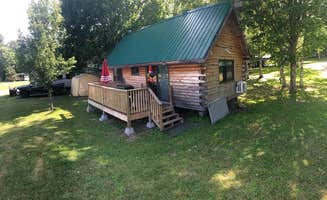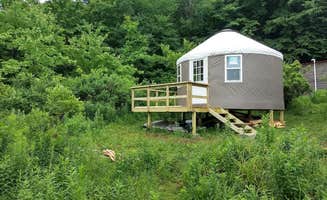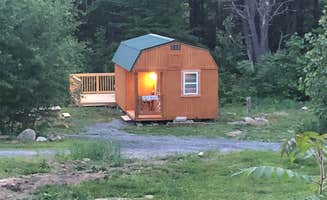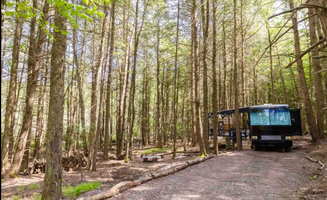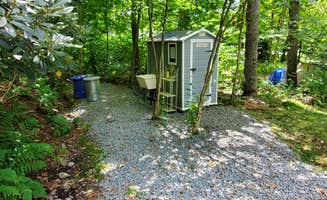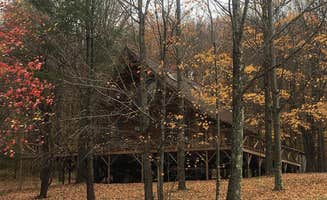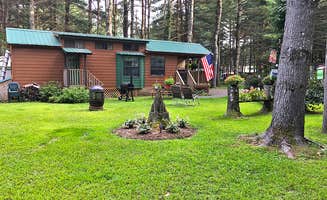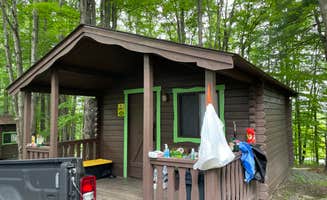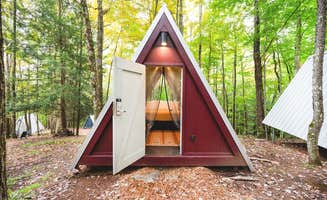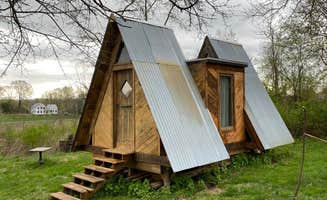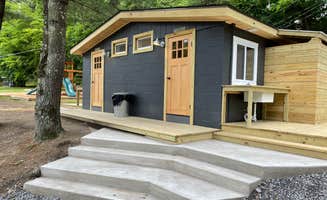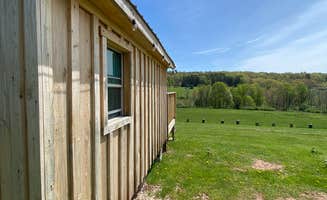Cabin camping near Highmount, New York provides visitors access to the central Catskill region at elevations between 1,400-2,200 feet. Winter temperatures often drop below freezing while summer highs typically reach 70-80°F. Many cabins remain accessible year-round, though amenities vary seasonally with most campground facilities fully operational from May through October.
What to do
Hiking accessible trails: Multiple trailheads within 20 minutes of Blue Mountain Reservation provide access to eastern Catskill routes. "This was my first time staying at this campground. I went here with my friend and we were using it as our base camp as we went out in trails in the eastern Catskills notably the Devils Path, echo lake, etc. It's proximity to those trail heads was great," notes one visitor who appreciated the convenient location.
Local waterfall exploration: Several cascades near Max V. Shaul State Park offer natural swimming opportunities during summer months. A camper mentions, "there's no pond/lake here but there's several waterfalls nearby and vromans nose," highlighting alternative water activities beyond traditional lake swimming. Waterfall access points typically require short hikes under 2 miles.
Children's recreational activities: Family-centered programming runs throughout summer at Jellystone Park Gardiner, particularly on weekends. "This campground has a lot of activities and has kids of all ages galore. I was worried my 12 year old would be too old for it but he enjoyed making friends there," shares one parent. Activities include laser tag, bounce pillows, and scheduled themed events from Memorial Day through Labor Day.
What campers like
Creek access for cooling off: Rip Van Winkle Campgrounds offers direct water access from select sites. "We were over in 'Lover's Lane' so it was isolated on a separate loop. Couples only on this loop, no kids! Pricey--$60 a night. But super nice being right on the creek--we took our chairs and plopped down in the water," explains a visitor who enjoyed the creek-side location.
Secluded tent sites: Country Roads Campground features tent-specific areas set apart from RV sections. As one camper notes, "Mainly an RV ground, but they have about 10-15 great tent sites back beyond the RV area. There are water spigots near all the tent sites and they are nice and spread out." These sites typically cost $35-45 per night and include access to common facilities.
Updated bathroom facilities: Recent renovations at some parks have improved shower and restroom conditions. A Max V. Shaul camper reports, "They have new bathrooms/showers and family bathrooms. There's a playground, a pavilion, they do fireside jams." Another visitor confirmed, stating it has "the cleanest facilities ever!"
What you should know
Bathroom facility limitations: Availability and cleanliness vary significantly between campgrounds, with some locations having insufficient facilities for peak periods. A visitor to Thousand Trails Rondout Valley noted practical concerns: "The laundry room, which needed some updates, especially some lighting. It has a pretty large staircase and at night with a handful of laundry, it was a little scary navigating without lights."
Cabin amenity variations: While most cabins include basic furnishings, specific amenities differ greatly. The Blueberry Patch offers more rustic accommodations with wood stoves for heating. "A wood oven stove to keep us cozy our entire stay. Great for those seeking quiet and zen like space. The fire pit was a plus to the view," shares one winter visitor, indicating the importance of understanding heating options for off-season stays.
Cell service considerations: Coverage varies throughout the region with most campgrounds near main roads offering adequate service. At Rip Van Winkle, one long-term visitor reported, "Cell coverage was good for us to work (att & Verizon)," which proves valuable for those needing connectivity during cabin stays.
Tips for camping with families
Pool access importance: Jellystone Park Gardiner provides water features specifically designed for younger children. "Nice pool that is shallow so you can relax and let the little ones go in the water park section alone or they have a 3 ft pool also. My older kids preferred a deeper pool but they still had a great time," notes a parent, highlighting the importance of age-appropriate water activities.
Noise level expectations: Many campgrounds experience significant activity early morning through late evening, especially during peak season. "Kids were at the playground 8 am or before and the noise woke us up. The kids were around until about 10:30 or so each night. People tend to walk through your campsite constantly," reports a Jellystone visitor, suggesting families consider site location relative to common areas.
Camp store availability: Most established cabin campgrounds maintain on-site stores with essentials. At Blue Mountain, a camper noted, "They have a camp store at the front of the property and it's stocked with basically anything you could think of needing including charcoal, ice, firewood among other camp items." These stores typically operate during daytime hours with limited evening accessibility.
Tips from RVers
Site leveling requirements: Many campgrounds feature moderately uneven terrain requiring adjustment equipment. At Thousand Trails Rondout Valley, a visitor shared practical advice: "This is what I want for a Catskill campground. It is not a concrete pad haven and yes, there is mud. Our site was even and easy to level on." This indicates the importance of bringing leveling blocks even when staying in cabins with attached RV sites.
Seasonal maintenance variations: Quality of roads and sites can change substantially between spring and fall. A recent visitor to Thousand Trails noted, "There must be new management because many upgrades have been made over the past year which include all new SWE (full hookups) street lighting, and campground markings/numbering." This suggests researching recent reviews before booking cabin accommodations with vehicle access requirements.


